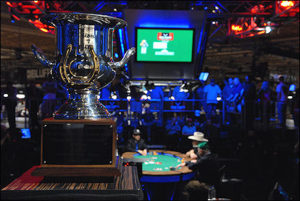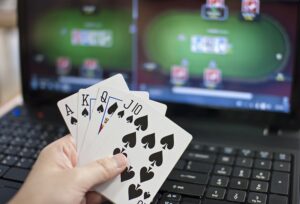ON-LINE POKER A GAME OF CHANCE OR A GAME OF SKILL?
On-line poker a game of chance or a game of skill?
I’ve been thinking about this quite a bit lately and wonder, is on-line poker a game of skill? Will it be able to meet the existing legal criteria required to make it a game of skill? And what, exactly, makes poker a game of skill? The existing live game structure has produced many players that make their livelihood through the skills they bring to the poker table.
What factors go into winning through skill? I cannot find the elements our legal system used to determine that poker is a game of skill (perhaps there are no elements and skill is implied), so I am forced to hypothesize on what these factors are likely to be. In traditional poker there is the betting strategy, reading your opponent(s) and strength of table position. These three elements combine to make live poker a game of skill; because, through development and application of the three you can win the pot without having the best hand. It’s interesting to note from what I have been able to discover that the law favors stud poker as a game of skill but not draw poker.
Betting strategy and table position are both elements present in on-line poker; but how about reading your opponents? Obviously, reading tells isn’t present in the same form or to the degree found in traditional poker so the question becomes, “How necessary are skills to read opponents tells in making poker a game of skill? If reads are totally removed all that’s left are the bet and table position; then, without the ability to have a feel for what the opponent maybe holding it becomes more like draw poker. But, this is not the case, there are on-line tells and ways to read past the tiny little pixilated avatars of your opponents. The problem traditional players have with the on line reads is shifting their skills to tells of a generally different form. I present a few intuitive on line tells:
1. If an opponent is using the auto-check/bet button it’s usually a good indication they don’t have a hand when the autocheck is activated or do have a hand in the case of autobet.
2. Past betting/playing tactics, will give me a good idea of where a player stands in a hand.
3. A bet or raise on 4th/5th street by a checking opponent is a solid indication they improved their drawing hand.
Of course, the sophisticated player may be presenting misinformation and setting a trap, another level of skill.
So there are on-line tells and when combined with traditional game elements on line poker would appear to be very much a game of skill. If on line poker is a game of skill, can I make a living at it?
Part II. The three certainties in life: Death, Taxes, and reading this joke.
Taxes & IRS
In 1987, the Supreme Court issued a decision upholding a taxpayer’s claim that his gambling (playing poker) constituted a business. The Supreme Court ruled that the proper test to determine if an activity is a “trade or business” is that the taxpayer must be involved in the activity with regularity and continuity with the primary purpose or expectation of making a profit. A quote from the Supreme Court’s ruling follows:
“If a taxpayer devotes his full-time activity to gambling and it is his intended livelihood source, it would seem that basic concepts of fairness demand that his activity be regarded as a trade or business just as any other readily accepted activity, such as being a retail store proprietor or, to come closer categorically, a casino operator or an active trader on the exchanges.”
The Court went on to further clarify its’ opinion by stating:
“A sporadic activity, a hobby, or an amusement diversion does not qualify.”
Poker is the one card game where the best hand does not always win the money. There are two basic ways to win in poker; either have the best hand or through your actions convince your opponent you have the best hand. If the winner was always the best hand poker would be a game of chance. The best a player could expect over the long haul would be to break even and after subtracting the rake would always show a loss. This would be an easy call for the IRS since it does not meet any of the above criteria; therefore, we must assume that poker is a game of skill and the professional poker player can earn their livelihood by developing and using specialized skill sets whither in a live game or playing on the Internet.
I am certain that the first test of on line poker as a game of skill is nigh at hand and probably will come in the form of the IRS attempting to disallow a taxpayer’s claim of being a professional poker player. Everyone playing Internet poker should always declare all winning and deductions to the extent allowed by the IRS code.







 Beranda
Beranda
 Whatsapp
Whatsapp
 Daftar
Daftar
 Promosi
Promosi
 Telegram
Telegram